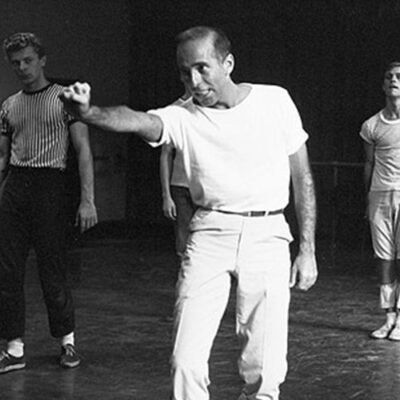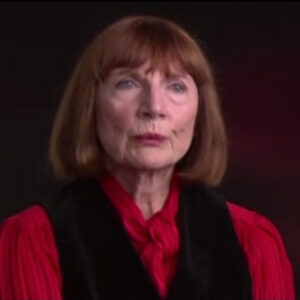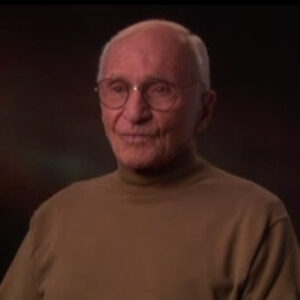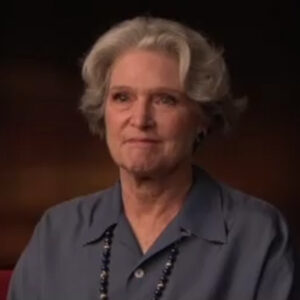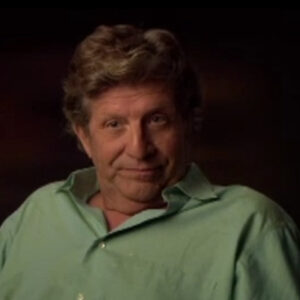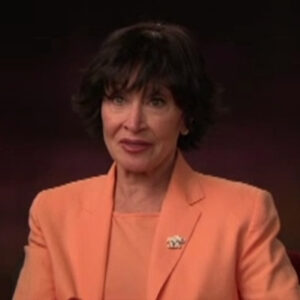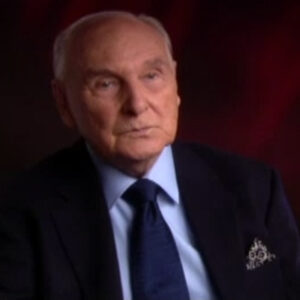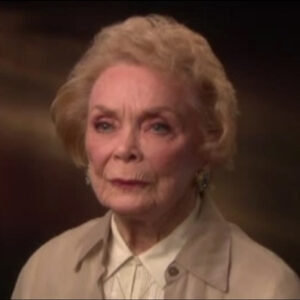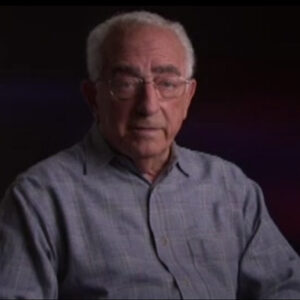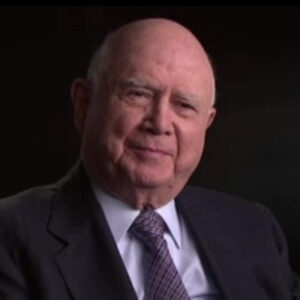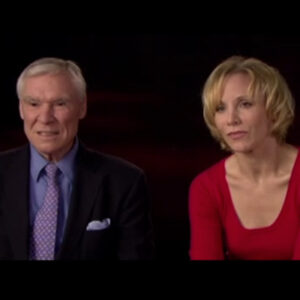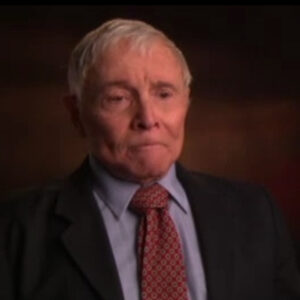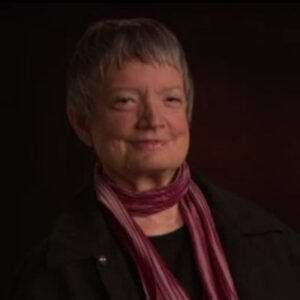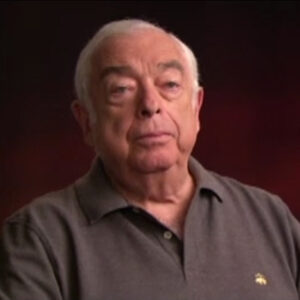Speaker I think Jerry loved your letter and all of us did, too, of course, already we loved Italy as well, but it was very special because all that wonderful world of music right in the heart of Italy and the Italians, and it was quite the national blood of dancers with all those nationalities. I remember that wonderful little Russian lady who died.
Speaker Unfortunately, since then, she said something about it a little bit like bizarre but wonderful, bizarre. She was so funny. All of us dancing pieces we knew, but not always the ones we were imagining we would dance. But it was left to him to choose what he needed. And he had prepared a presentation with all of us doing little excerpts of Swan Lake in counterpoint and augmenting the number of dancers until we were all there. And there was a special waltz also after that at the beginning or and then the paraders from Swan Lake had come to the end and the public was very responsive to Cassian. And it was also a bit special because John Kirienko had just died and we dedicated to John Grainco.
Speaker You know, I’m not 100 percent sure of the chronology, but Jerry was away from the company for a while and then in nineteen sixty nine he came back to the company. And could you just sort of set the scene for us what was going on at the New York City Ballet at that time that made it a particularly opportune moment for Jerry to come back and work there? Do you know what I’m talking about?
Speaker I’m trying to remember what was going on with the company in and around 1969.
Speaker There was a traumatic event in Balanchine’s. Life, and he was not so productive during that, Suzanne Farrell, of course, of course.
Speaker OK, I understand now what it was in that at that time in the New York City Ballet for Balanchine, with the departure of Suzanne Farrell, it was probably very difficult. And Jerry coming back, of course, was the one only possibility to such an extent and the one best possible decision to. And of course, Balanchine always gave Jerry carte blanche. He could do what he wanted. And for some of us were very little afraid of Jerry. The fact that Balanchine trusted him so much was enough of a proof for us to give ourselves entirely to Jerry to do what you wanted with us. So in that sense, we were working with both of them, even if sometimes it went through Balanchine a little bit, just like Balanchine’s total respect and admiration for Jerry, which was so extraordinary to watch when you would stand in the wings watching those dance robins and retracing how Jerry had used those to discover things about us that maybe Jerry had seen and maybe not himself. Balanchine, it was such an extraordinary operation, which was much more than parallel with those two amazing talents being parallel and as important as one another. But it was also the interconnections of understanding that they had of us their dancers. So, of course, Jerry was so full and so rich of ready to make contributions. He was so excited and so exciting. And for me, there was so much about him that I felt was so different from Balanchine because Jerry was much more a man of the world. So was Mr. B. He had no need all, but he had let it go in a way. But Jerry was still involved in it. And that produced danger, excitement, difficulties. But it was also tempting and seductive, very seductive, sexy, you know, really sexy. So that was wonderful at that time.
Speaker What do you mean? He was a man of the world.
Speaker For Jerry, the world mattered very much because his sense of perfection, as we all know, was so acute and so merciless to himself and indirectly, sometimes to others, that he never was sure enough of himself. He wasn’t certain enough of himself. Even with that incredible talent, he wasn’t sure that it was ever enough or good enough, because in a way, in a way, it was all about love. Of course it was all about love. We needed to love him a lot and he needed to love us. And he wanted to be loved so badly, so badly. And that’s what it was all about when he was when he was impatient. Difficulty, sometimes a little cruel, but it was all about love. It was the only resolve that we could do. So Jerry was a man of the world. In that sense, it mattered for him. Success mattered whenever Balanchine the heartbreaks were long ago already at that time. And he was beyond that. And he was serene and he was doing his work. And also Jerry communicated with us in more worldly, recognizable ways in terms Balanchine communicated with us through the liturgy.
Speaker It was much more that the purity of the classical school of dancing, of ballet was really Balanchine language with us. We shared that language and it was not very psychological and it was not a psychiatrist by any means.
Speaker Whenever it was Jerry, there was much more psychology involved, much more, and there was much more emotional content that was absolutely indispensable for him to function with the negative and the positive aspects of emotional things.
Speaker Can you give me an example?
Speaker Gerri sometimes had to test us to in our patience, in our devotion and in our devotion to really make sure that he could go ahead and do what he wanted with us.
Speaker He needed to make us go through certain difficult things in order to be able to have us in his hands. So those were methods that were not very New York City Ballet, like with Balanchine, only with Balanchine. There was apparently a sort of detached and distant manner that was not really there, but it was the proper distance that you create with someone else when you know that there’s a common ground in between. And we would meet in that common ground of the love of music and the love of ballet with Jerry. It had to be more personal, more with the human aspects, the negative and the positive ones, so that he could really be sure that he had enough communication from us and with us.
Speaker I’m just going to be with his company. And I had no idea that he was such a close friend of.
Speaker Yeah, oh.
Speaker Was there? How did that connection happen? I mean, were you aware of the relationship?
Speaker No, I did not know and I don’t remember that I spoke with mother or that you would speak to me. He was adorable. He was so adorable, such an exquisite person, so patient and so just adorable. There’s no other way of putting it all together.
Speaker Yeah. So let’s talk about that. You were in the original cast.
Speaker Tell me what you remember about the dancers at the gathering was extraordinary because it was a great, wonderful tree growing right in front of us. We thought we had to leave a branch and then very quickly it became a tree.
Speaker It was so amazing to see how inspired he was. He was so ready. He had prepared so much. He had lived through so much. He was just delivering it. It was just flowing out of him.
Speaker It was remarkable. And it grew bigger and bigger and bigger. All of us waiting for the wonderful stuff. And I remember when he did my solo in particular. He danced it in order to make it and because of the kind of soloists he was able to dance it so well and with such exact amount of movement and energy and subtlety and wit and tenderness that I thought to myself, I’ll never be able to do this thing.
Speaker He should do it. Why doesn’t he do it? He’s so good. So it was very hard to imagine dancing it, but of course he made me do it for by phrase and changing things. And it was such a different experience for me because I was used to more forceful dancing and not to end blind and underwater. And the subtle touches little spurts, but just it was extraordinary.
Speaker And the way he was toning it, tuning it down and turning up or whatever, it was amazing and experience and watching what he was doing with everyone else. And of course, at some point my turn came for Jerry to tell me I want you to learn also such and such and such s. and such and such. And in order for me to learn them with him. In fact, in the morning I couldn’t go to my class, so I had to prepare myself. And I was missing my classes and a little worried about my performances at night.
Speaker But I bravely tried to learn many of the things. And when he came to some of the big lift where you throw the girl and you hope the boat catches there, I thought it was a little bit much and I started getting a little worried about that. But I did what I could at the time, but I knew that it was never going to do those things. But I thought, OK, he wants to see it and he is entitled to it’s a good exercise for us. It’s because he needed to make us exercise in ways we were not used to. We couldn’t take ourselves for granted anymore. That was Balanchine also. And dressed as if I can say such a weight in such a way, he got us, you know, totally devoid of any extraneous things, but in a different way.
Speaker With Jerry, it was a calculated, maybe more painful way, but it was for the same result. It was so that you would be, in a way, totally available for what he would want you to do.
Speaker What did you. Did he give you when he was making this a gathering about the atmosphere of the piece or how you should relate to each other, where you were or you know what I mean, in addition to the steps? What did he tell you about that?
Speaker Well, you know, the only other dance that that I really danced from Jerry in that particular ballet I inherited, one of the wonderful dancers of Allegra Kent with the three boys. And I know that Jerry must have talked about that feel with some of the dancers and relationships, possibly, but for me, sort of pretty much waited to see what I could recognize or understand of it. And then, as he always did, he toned down a little bit or he suggested a little bit more and.
Speaker It was really not specific, he was it’s funny that for some of the things he was demanding and some of the other things he waited to see what you were going to come up with, like Balanchine did a great deal also in that in that sense, they shared that to.
Speaker How was dance sort of gathering different stylistically from anything you’ve danced before, you talked about that a little bit, but if you could expand on.
Speaker You know, first of all, when I tried in New York City Ballet, I was astounded because I never thought of was a Balanchine dancer. But then I quickly realized why Balanchine would like me in his wonderful gallery of different flowers, animals, as he used to qualifiers. And I never thought that I could dance. Jerry Robbins ballet properly, even less, because that was something American that I had never completely had to acquire because I was a French dancer dancing in America. And with Balanchine I was in the universal style is sort of like.
Speaker Everything style and recognizing the different styles of each particular ballet, but the American and brand was really Jeri’s and Mr. Bush used to say that all the time to me.
Speaker He used to say, you know, I’m not the American choreographer in this company. It is Jerry. Jerry is really the great American choreographer. He always told me that. And it was not with despair or sadness. It was with pleasure and joy and respect. So dancing, Jerry, I was waiting for my orders.
Speaker I was waiting for corrections. I was waiting for suggestions. And in a way, I began to pick it up from the choreography itself because it was all there. And I had seen enough American dancers in different situations and choreographers to know what that wonderful little swagger was, which was is not at all a French thing. Swagger is not a French thing, just like humor is not very French either. And also the liberation of you and your body is a form of liberation in Libya is sort of a slip of the damned classical dancer that was new to me and different from what Balanchine was asking for with Balanchine.
Speaker There was a boldness in the attack and the energy and if freedom of space.
Speaker But with Jerry, there was a more subtle, almost sexy revelation of your particular sexual personality, also that you never thought of showing in a not Jim roles. It was codified and it was platen NECI.
Speaker Did Jerry encourage you more than Balanchine or how did he encourage you to relate to each other on stage?
Speaker I’m trying to remember if, Jerry. And courage does the dancers to relate to each other on stage. Yes, in at a gathering, yes. And the last entrance that we all make at the end is there to prove it in a way also.
Speaker But you see, I was not really dancing or touching and, you know, my partner’s what I had personally, but through the other pieces that I saw and that had worked a little bit on for a while, I definitely realized that, yes, Jerry must have had to say some things.
Speaker There definitely some people have told me that he liked kind of simple, honest movement. Could you explain that?
Speaker Well, you know, his taste, his sense of theater. He said, but his musicianship equal to Balanchine in many ways, I mean, prevented him from any excess or any artificially grafted effect from effects from extraneous like Balanchine. There was a research of purity there, too. He also was in fact, he wanted everything, but he also wanted very little. That would be incredibly important and significant. So he was on that research of the most with the less. With the least. With the least. The most. With the least in a way. And so. Yes. And you can’t produce that unless there’s a point of honesty. I would go even further integrity. There’s an integrity to the material, to what it is and to yourself. Then you become more of a servant rather than showing yourself off.
Speaker And what kind of notes do they give as long as we’re comparing them, what kind of how is it different in the kind of notes that they gave you if they came to talk to you after a battle? Typically, how would their comments differ?
Speaker Well, Balanchine waited to see if you might understand some maybe little things that you were embarking on that were also maybe not wanted or if there were some weaknesses that you had to remedy. Jerry didn’t wait. Jerry came much sooner. And sometimes you could see he was angry also a little bit and controlling himself.
Speaker And sometimes they got angry if you didn’t control himself. It was almost better because the storm was over sooner. The difficulty in his anger, I remember he had clenched teeth, you know, so it was difficult a little bit. But he came sooner and didn’t allow you to go for too long. And, you know, with the discipline of Broadway, I often wondered if that was not also a particular form of discipline that you learn on the Broadway stage in the Broadway productions, because there’s so much money at play and time is money. And, you know, everything is money. And you have to be on the sharp or possible edge of everything again. But in the same time, it rejoined the research for purity and quality.
Speaker Several people have told me that of all the problems, ballet galleries, they love to perform. How do you feel about performing?
Speaker I absolutely adored it. It was so the colors were really pastel. The painting was impossible. Still, it was the delicacy, the subtlety, the tenderness, lying. And in that ballet, from the music and from the choreography and from Jerry’s understanding, the taste, the refinement. It was in itself another form of stockhorse, also an American aristocracy, in a way, but it was the same achievement in aristocracy that Balanchine had done in a more Russian universal way.
Speaker When Balanchine said that he felt Jerry was the real American choreographer, what do you think he meant?
Speaker What Balanchine meant is, again, that wonderful freedom that Jerry had acquired from learning so many different forms of dance because he had learned those things.
Speaker Also, having been involved with actors even more than Balanchine had, having worked with plays, show biz, everything, and having resolved those things so brilliantly and also the richness of the brand, the difference being translated into a ballet. They were in the ballet, but you could tell their origins were different. Some of them, they were the. How do you say when you have completely distilled they were the distillations. His brand of ballet was the distillation of many other experiences. Of course, although human experience is there for everybody, we can get rid of the human personality and thank God. But it was also the other forms of dance that he knew and the other form of theater presentations that he knew also, and that made him like America is the great big melting pot in a way that he had that he was that he represented that.
Speaker He was his own self-contained melting pot.
Speaker But you were there before we get off dance’s together. Is there anything else you’d like to say about.
Speaker Abundance has at a gathering. It’s one of those very rare high summit that you hope for a great choreographer to have in his life and for Jerry, I think it will remain one of the highest point of all his creation. And, you know, it’s just one of those things.
Speaker You were also in the original cast in the night.
Speaker Oh, yes, yes.
Speaker How is it different?
Speaker Very different. And my piece particularly was. OK, yes, they are in the night was a very different kind of ballet. And my section with Peter Martin, with whom I didn’t always get to dance because I was petite and I had more petite partners and the big guys was reserved for the bigger ballerinas. So dancing with Peter Martins was extraordinary for me because there was so much of him there and the lifts and the fishes and everything, it was wonderful. Also, it had a certain rigour and a certain, I would say, academic aspect at the beginning in a very formal setting were very formal, obviously married, no question about that. Not girlfriend boyfriend, but the married type. And, you know, it became something a little more tense, tempestuous, of course, but there was a trust that remained between the two and peace came at the end very easily and very quickly. So it was a very different thing to do, but wonderful. And I enjoyed it again. Schopper again, Jerry. But Jerry in a very different mood, very different now because my former Jerry more formal, more, if you would say, conscious of form of ballet there and and manners, worldly manners, you know, you know, give me your hand. Invitations, responses, you know, courtesy, very clear courtesy and all that.
Speaker Um, tell me what he was like when he was making new ballet.
Speaker Jerry making a new ballet. The Hall of Jerry whitcome through.
Speaker All the tenderness, all the refinement, all the wonderful, heartfelt aspects of his love for dance and music and the dancers, but in the same time you had to expect he is fierce. He his.
Speaker His anger and impatience with us sometimes and with what he was doing, I I’m convinced that if he got angry with us, we deserved it. I think some of sometimes and it was an exercise for it and it was a hard exercise then we knew, but it was so worthwhile. And also, I think he was angry at himself sometimes, too, and he was not angry at us all the time, either pianist or whatever, even though he’d look that way. I think he was about himself because maybe it wasn’t coming fast enough, well enough or good enough. He was such a perfectionist, you know, and you have to respect that so much.
Speaker The only thing is that we all know that perfection is hard to reach and that it’s on the way to perfection that we really are. And so it was it would have been nice to be able to tell Jerry, Jerry, you know, it’s the trip that we are taking together that matters here. But I don’t know if we all knew that the driver who we all knew that, but she was all there.
Speaker And you were so prepared, you know, so prepared.
Speaker How was the process of making Jerry different than it was with process with Balanchine?
Speaker The work came out of him almost ready to walk the way. We could walk right away, and it was done. He had prepared he knew what he had done, what why he had chosen you for specific reasons. And by the time you had studied his music and he had a clear idea of what you wanted the ballet to look like, he always told me that himself. I know what the ballet should look like. And then I proceed and I just trust that. And so there was a delicious experience of a wonderful gourmet meal. And then you were left to power afterwards and digest and purr with Jerry. Jerry put himself in doubt all the time, double checked on himself, made sure that he couldn’t come up with something better or different.
Speaker And we had to go with him. We had to follow that because that was the way it was with Jerry. And we did. We had no choice. But it’s also not that we were not under duress in that sense. We wanted to sometimes we wanted it because we were going to drop dead and sometimes we wanted it because we remembered that it was all for the best and the better.
Speaker You know, you give me an example about how this kind of double checking or insecurity manifested itself well from one to another.
Speaker You know, he would make changes and we were doing those changes thinking, oh, my God, this is not going to go, but we have to make a good front and do it. And I remember Balanchine telling me once in class for an exercise that was particularly hard for me. Joan of Arc used to say, Bokat, a ball vizcarra. And I remembered that when it was working. He also vocal both his age. So anyway, but the worst is when right before performance, he would put something in doubt and that you was something else that was the most unsettling thing. But again, it was another test of devotion and of also for ourselves, a personal test for ourselves to try to do it, because who are we and what are we with other choreographers?
Speaker In terms of. Well, let me ask you this way, when I was privy to Balanchine and watched him, I had a sense that he really trusted his dancers. Would you say that was true more or less for Jerry and how was it demonstrated?
Speaker Do you know, I’m convinced that even when Jerry seemed to doubt our capacities or our efforts or our attitudes, I’m convinced that he trusted us because I knew and he had literally told me so that he liked me very much and loved my dancing, and which was something so precious to me because I felt it was a miracle because I was not that kind of a dancer. But you see, like Balanchine, he liked many different things. So that was very encouraging. And I always would remember that because there were movement. When you were wondering, though, a little bit. But it is true that all of that was, again, a test he wanted to see. Again, check on your devotion and your faithfulness to him. And I think that with Balanchine, it was more peaceful. He was beyond, in a way, with Jerry. He was right in it. You know, he was not distant from his own achievement and all his when Balanchine finished her ballet. I have to mention this because it was really amazing. He would immediately forget it and say, I’m so glad you like it. Thank you for telling me you like it and you take care of it now and preparing other things. It’s yours. And the umbilical cord was cut with Jerry. You knew that the umbilical cord was still somewhere there. He it was a work at work in the works. The work was in the works with him all the time.
Speaker He would keep working on it and want to maybe try other things. So he never completely left you alone, except for the moment you perform and you were really without him. But Al said that there was a certain hovering over you, still haunting you a little bit still.
Speaker And how did that make you feel?
Speaker Well, again, I had to accept that as another way of existing. And, you know, I had experience with choreographer’s in Europe. And I must say, quite frankly, that because you didn’t get that kind of choreography from the choreographers you were working with, you were so happy when you got a good step and, you know, you were so pleased, you know, because some of it was shaky. So, I mean, I was pretty conditioned to accept a little bit of effort while being put in question. You know, for this, I was prepared for that because I knew what the outcome would be magnificent.
Speaker One of the hallmarks of Jeri’s choreography is that he made wonderful duets. In the 90s. What was so great about.
Speaker I think that what makes Jeri’s DURET so incredible are the the how could you say the revelation of the relations between the dancers and its.
Speaker It’s really what he wanted to obtain from the people who happen to be the dancers that happened to do that choreography, so the provocation of Jerry, the choreography made the drama of that relation come to the surface and, you know, to flourish, to be revealed. It was that it was what he gave you to reveal what he wanted. And he was so he was so clever and so inspired and so knowledgeable of material that he could afford to do such things.
Speaker What was different about Jerry is different from other choreographers Irving used me in.
Speaker I think that it’s really the material he gave you. The choreography he came up for you with that and your struggle to achieve it and making making it look right and good, the work with your partner, the relation that it provoked with the partner, also all that in the end revealed this situation. Then you got the atmosphere that you wanted to create from your relationship with a partner and the choreography had given you. It was so calculated, thought out, chosen and administered with no question. And no doubt it was recognizable and it was their.
Speaker You were present at a rare occasion when Balanchine and Jerry were in a piece together, right. Tell me about that experience. It must have been extraordinary.
Speaker You know, the experience of Punchinello with both Mr. Billy and Jerry together was just extraordinary. It was amazing, especially to be personal, that in my long solo, which was about eight minutes long, Mr. Balanchine started and Jerry finished. So I had the two of them before that when the solo. But it was also the mood of Pulcinella being what it was with that sort of, you know, the wonderful commedia dell’arte and also the slightly more grotesque aspects of the decor, costumes, the music, everything. I mean, it was really an amazing experience.
Speaker And Balanchine showing Villella privately. Once I happened to be next to Lincoln Kirstein watching Villella rehearse with Mr. B and Lincoln said, this is an amazing moment because he all the Commedia dell’arte there in all the Russian theater as we know it, the great Russian theater All-In-One, the way Balanchine was showing, showing it.
Speaker And it was just a very happy experience and very different from any other ballet in the New York City Ballet repertory. It was a jolly, joyous and unusual ballet.
Speaker Can you describe it a little bit for me for.
Speaker Oh, you know, there were many scenes, of course, and some of it I have not forgotten, you know, but there was a spaghetti battle that was absolutely incredible. But also on the first night, both Jerry Robbins and Mr. Balanchine performed the two beggars. And I think it was a little wink at some of the critics who had begun to remember that maybe there was a little competition or dissension between the two of them and that they were competing with each other. And so they said, OK, all right, well, show them. And they came out and what they did was just nice and describable to nobody, you know. And I had a very lovely part to do also with the Villella and Villella had many wonderful things to do, which were also very different from him, from anything he had done before. Some of it, I’m afraid I have forgotten to.
Speaker Tell me a little bit more about Mr. B and Jerry. You said they were they were extraordinary. Tell me about that.
Speaker Yeah, well, you mean together? Oh, they were they were extraordinary because they were that way also in life in the way they would confer together head to forehead to forehead practically. And they would do and Balanchine would bend one leg and put one hand in one pocket. And Jerry would would, you know, explain something. And Balanchine would listen and say, OK, yeah. You know, and they had the complicity. They have the continuous complicity they were putting together. And that was very reassuring for us. We thought, you know, never too much to have two great cooks in the kitchen to good cooks are very necessary. They were really flatting. And that atmosphere, that friendship of their complicity, it was just adorable.
Speaker And what was it like when they performed together?
Speaker Oh, it was it was just wonderful because they were trying to upstage each other, doing things that were upstaging each other, really, and also being, again, together to remember when they took the vows. I think you remember that. Didn’t they come together or something? Yeah. And also then for anybody who had a doubt, then they could see who it really was or something like that. Yes. Yeah.
Speaker I think those kind of, you know, after you know, after years.
Speaker That’s it. That was it. Yeah. I see. I sort of forgot a little bit about the vows, but yeah, it was again, like, you know, overly polite to each other. Again, part of the same little plot.
Speaker Yeah.
Speaker There’s a recording of those bells actually. Oh, terrific. That’s great. Um.
Speaker When when they were together, working, who was in charge and what made that obvious?
Speaker Well, you know, I think that in a way, I think that balance in knowing Jerry the way he did made it without doing it sort of place Jerry in charge. You know, but, you know, in any way for anything, neither Jerry would have been in charge, I think about Balanchine was also very well in charge. He was supervising everything, but he made Jerry the active one charge more man, really? Because knowing Jerry, he felt probably Jerry would be more comfortable that way.
Speaker And with Mr. Beat there for the dancers, the world was at peace. We were fine.
Speaker So with two great geniuses working on this production, it should have been a big success. What happened?
Speaker Or at the production, well, it’s really mainly that it’s such a special specialty, you know, speciality little Amazon, but nobody eats it because there are other, more recognizable meals you come from. You know, it was it was a maybe not very public recognizable piece.
Speaker Maybe the public didn’t quite understand how wonderful it was to have this particular occasion. Maybe now they would more maybe now they would more in the historical context of the New York City Ballet. Now, they would look at it twice with different. Sometimes public is not ready for pieces like that in that company. You don’t expect that. You expect the first year and they’re more.
Speaker If you could set the scene for us, we could go back a little bit what was happening in the company that into the context for Punchinello, there was a big event happening. You could just tell us about that.
Speaker I’m not sure that I remember exactly what was going on. Oh, yes, of course. Thank you. I’m getting old, you know.
Speaker OK, so this was the time of the year Stravinsky Festival. Oh my God, that was wonderful because there was so much of starving ski represented and so much that was already existing and that was so good and so much more that God doesn’t really. And I remember that I had the tiny little party in Von Hemlock, the Bach Cantata, orchestrated by with Tony Blair and little lovely little moment there. And but the whole what was put in front of the public was an amazing, amazing array of works by both Jerry and Mr B.. You know, it was really quite an amazing thing. And also, this company dances that music is so well schooled to dance music by Balanchine and Jerry in, you know.
Speaker What did Gerri bring out in you that she didn’t?
Speaker Well.
Speaker An American site that I didn’t know I had Jerry might have brought out of me and expectedly my American acquired side that I didn’t know I had. I think he did. And also he you know, when he did for Battelle’s for some Cuban food myself, that wonderful veteran paid to do that was such a nice study of what he saw of French dancers in the New York City Ballet. So that that particular context gives an idea of Jerry keeping me French, but making me so king me a little bit in American marinade. I was marinated in America in that way. And so because for tells was exactly that, we started very formally as too important, you know, premier dancer and all that. And then it quickly became witty, funny, more combative, competitive and developed into other things and with a little bit more freedom also.
Speaker So I think Jerry brought that in me and forced me to maybe first me suggested to me and and made me want to tone down some things that I was used to do, maybe be more forcefully or energetically. He turned me down in a certain way, you know, he raised me a little bit in some places, edges, edges.
Speaker Several people have said she was always saying more and more or less, less, less, yes, because Balanchine had that sense of form that was so admirable and which is one of the reasons why the works are still with us, like because their buildings, their architectural achievements and with Jerry, the architecture was more moving, more in progress, more in the works, more in chenge.
Speaker Jerry had a sense of change which worked for him to perfection because he could capture trends, feelings from society, from art movements, from different things happening in all parts of society and the world, which Balanchine was not really so preoccupied about because he was making buildings. He was making those great, wonderful architectural achievements. But Jerry was playing with things that might not last the same way, but which were, you know, more fluid and more left to your imagination individually also.
Speaker What did you learn from him?
Speaker I learned. I learned that you literally cannot. Explain on tiredly the news that he had, you can see how he felt it. You can see how he prepared it to be solid, recognizable, concrete, you know, to give to feed dancers, to feed the dancers. But how can you explain that particular brand of judgment, of selectivity that he had, his type of perfection, his research? I mean, how can you explain that? You can’t really explain that. You have to have it. He had it from the start. He was driven by it and drove it and drove us with him and the gift.
Speaker But what I learnt also is that if you are lucky that you can discover what you have and have the tools of offering it, then it’s a great gift for the world. And we need gifts like that because we are confronted with such ugliness sometimes in the world that for the beauty who was able to create I mean, people like him are as important or as the great philosophers, the great other artists that we know and, you know, the contributions are. That is why the world is still there.
Speaker Is there anything about. Your work with Jerry or Jerry? I have to ask you, bless your heart.
Speaker I don’t think that you have forgotten to ask me anything. I don’t think I don’t think I think that because, you know, there’s only so much one can say. And then, you know, to as I was just saying now, to explain someone like him, we do the best we can to describe his talent, his ways of working, his attitude himself.
Speaker The only thing I would say is that I was a little bit in fear of him sometimes, which in a way I could regret, but did the same time my respect translated in those terms. Do I wish that I had known a little bit more maybe of him as a man? And I was very touched one day when he came to my dressing room and he had ripped his Achilles tendon and he knew that I had done that to myself, but not as bad as he is and that I had been repaired and I had been able to dance. But it had taken time and and he was literally wanting to be reassured and to be helped. And I was so touched because I had never seen Jerry like that because I didn’t go out with him, you know, ever. And, you know, I had in my background is sort of European thing that you respect your elders and your masters and your teachers so much. And from that generation, my mother was a schoolteacher. You know, you respect them so much that in the end you don’t dare to to ask questions or anything. And it made me want to and I think I did.
Speaker I think I took him in my arms and give him a big hug because I was amazed and, you know, amazed by his how could I see humility and the sense of how bad he felt and how little he felt about himself, you know, and I wanted to reassure him.

